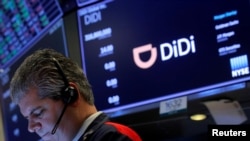At least four lawsuits have been filed on behalf of U.S. investors after questions emerged about whether the Chinese ride-hailing firm Didi Global Inc. had been warned by Beijing regulators to postpone its multi-billion-dollar initial public offering (IPO) on the New York Stock Exchange (NYSE).
The suits reflect rising concern over the political risk of investing in U.S.-listed Chinese companies.
Labaton Sucharow LLP, a shareholder-rights law firm in New York, announced on July 6 that it was investigating claims on behalf of investors in Didi Global Inc. New York- based investor-rights law firm Rosen also has filed a class action lawsuit against Didi, “seeking to recover damages for Didi investors under the federal securities laws.”
Two other law firms, Schall Law Firm in Los Angeles and Glancy Prongay & Murray LLP, of Berkeley, California, have filed similar lawsuits in the past few days.
“The key lies in whether Didi has received any oral or written warning from the Chinese government before the IPO,” Guo Yafu, founder and CEO of the New York investment advisory firm TJ Capital Management told VOA Mandarin.
“If it had, Didi has a legal responsibility to disclose that information to the investors,” he told VOA Mandarin by phone Tuesday.
Wei Cheng, a former employee of Chinese e-commerce giant Alibaba founded Didi, China’s version of Uber, in 2012. Since then, the ride-hailing company has expanded its business to about 4,000 cities in 15 countries, including China, Australia, New Zealand, Japan, Brazil, Mexico, Chile, Colombia, Peru, Costa Rica, Panama, Russia, the Dominican Republic, and Argentina. It has roughly 493 million active annual users and 15 million drivers.
On June 30, Didi made its debut at $14 a share, which valued the company at $68 billion, making DiDi the largest IPO of a Chinese company listed on an American exchange since Alibaba raised $25 billion in 2014.
Two days later, on July 1, Beijing announced it was launching a cybersecurity review of the company and said new users would not be allowed to register with the company during the review. Over the weekend, the Cyberspace Administration of China (CAC), ordered Didi’s app removed from mobile app stores in China.
The Wall Street Journal citing people familiar with the matter, reported Monday that Chinese regulators had advised Didi to postpone its U.S. listing and “urged it to conduct a thorough self-examination of its network security.”
According to Reuters, Didi responded on Monday that it had no prior knowledge before its IPO that Beijing would launch an investigation of the company.
When the NYSE opened Tuesday after the long July 4 holiday weekend, Didi shares were down on the CAC news, and by the close, $15 billion of book value had been erased. Shares of other major Chinese companies traded in the U.S. also fell on Tuesday.
News of China’s investigation has raised concerns of the political risks that may adhere to U.S.-listed Chinese companies.
Jesse Fried, a Harvard Law School professor of corporate law, told VOA Mandarin that under the current legal framework, there’s little U.S. regulatory agencies can do to protect U.S. investors from regulatory actions by China that might harm U.S.-listed Chinese firms.
“In theory, the U.S. could bar China-based firms from listing in the U.S., but the SEC [U.S. Security and Exchange Commission] does not have the authority to do that as long as these firms provide adequate disclosure at the IPO,” he told VOA Mandarin via phone.
“I doubt China cares about inflicting losses on U.S. investors, which is why it can behave very aggressively toward U.S.-listed firms,” Fried said. “If Didi were listed in China, Chinese regulators would be more careful about curbing Didi because they would be concerned about backlash from Chinese investors.”
Apart from its crackdown on DIdi, Beijing also is investigating the online recruitment platform Kanzhun Ltd., which connects job seekers and hiring enterprises via a mobile app, and the Uber-like trucking startup, Full Truck Alliance Co. Both companies were listed in the U.S. recently. According to Bloomberg, there are as many as 34 Chinese firms seeking U.S. listings this year.
The New York Times reported that by targeting companies like Didi, Beijing is “sending a stark message to Chinese businesses about the government’s authority over them, even if they operate globally and their stock trades overseas.”
"Chinese stocks are just too risky now,” said Guo. “Today [Beijing officials] target Didi, yesterday they targeted Alibaba. The Chinese government is sending a message that they are not happy about the flood of U.S. IPOs by Chinese tech companies.”
He said Didi’s IPO will have a negative effect on Chinese companies that want to be listed in the U.S. in the future, adding, “Investors will likely think twice about whether they want to take the political risk posed by China’s efforts to control big data.”




